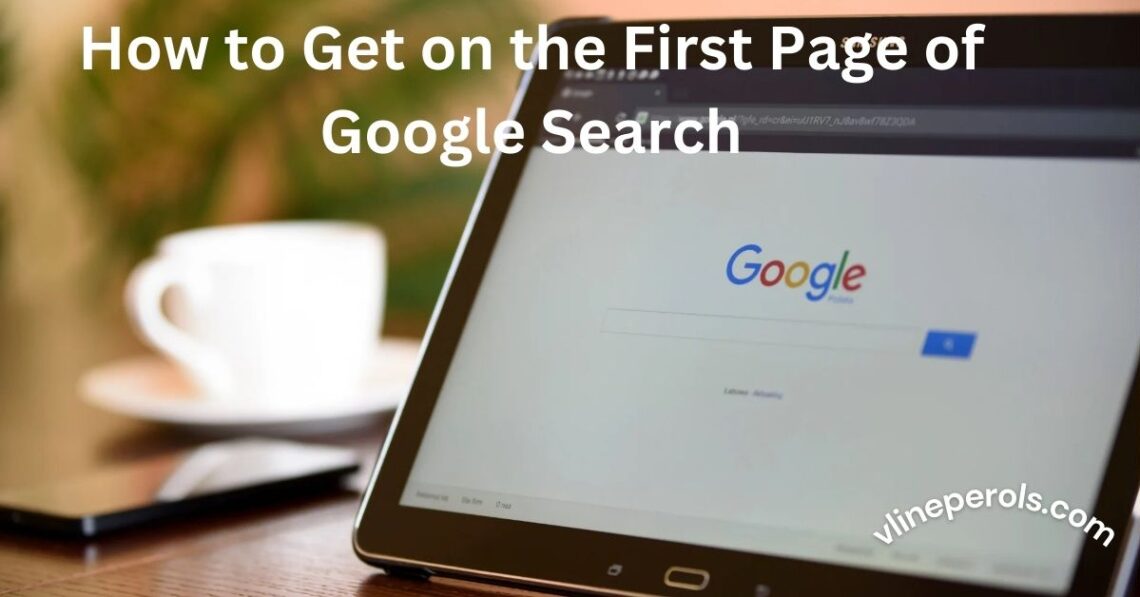
How to Get on the First Page of Google Search: A Comprehensive Guide by David Aziz
Achieving a high ranking on Google, particularly the first page, can seem challenging, but it’s highly possible with the right strategies. In this comprehensive guide, we’ll explore techniques that David Aziz and other digital marketing experts use to help websites get on the first page of Google. Whether you’re running a small business or managing a personal blog, these strategies are easy to follow and can boost your visibility in search results.
Why Ranking on Google’s First Page Matters
When your website ranks on the first page of Google, you’re more likely to attract visitors, gain credibility, and increase conversions. Studies show that around 75% of users never go beyond the first page, meaning your website is much more visible if it ranks higher. David Aziz emphasizes that the key to increasing your website’s reach is ensuring it appears in the top results for relevant searches.
Understanding How Google Ranks Pages
Google’s algorithms consider over 200 factors when ranking pages. While some are related to the technical structure of your website, others are based on the relevance and quality of your content. Factors such as backlinks, user engagement, content relevance, and page speed all contribute to your ranking.
David Aziz highlights that staying updated on changes in Google’s algorithm is crucial. Google frequently updates its algorithms to provide users with the best content, so it’s essential to keep up with these changes.
Keyword Research: Finding the Right Keywords
One of the first steps in SEO is identifying the right keywords. Keywords help Google understand what your page is about, so choosing keywords that are relevant to your audience’s search queries is essential. Here’s how to get started with keyword research:
- Identify Core Keywords: Use keywords that are central to your content. For instance, if you’re writing about SEO, core keywords might include “SEO tips,” “Google ranking,” and “how to rank on Google.”
- Use Tools: Tools like Google Keyword Planner, SEMrush, and Ahrefs help you find keywords with good search volume and low competition. Look for keywords that align with “how to get on first page of google search David Aziz” and related terms.
- Long-Tail Keywords: Long-tail keywords are specific phrases with lower competition. Phrases like “how to get on first page of google search David Aziz” are long-tail keywords that help target a more focused audience, making it easier to rank.
Creating High-Quality, Relevant Content
Content quality is a major ranking factor. Google values content that is informative, well-organized, and easy to understand. Here’s what to focus on when creating content:
- Make It User-Centric: Address the questions your audience is asking. For example, David Aziz’s guide would likely cover SEO basics, on-page optimization, and keyword usage, catering to users who want straightforward answers.
- Originality Matters: Avoid copying content from other sources. Google prioritizes original and valuable information. Adding your personal insights or unique data can also help your content stand out.
- Use Clear Headings and Subheadings: Divide your content into sections with clear headings. This structure helps readers navigate your page and improves your on-page SEO.
Optimizing Your On-Page SEO
On-page SEO involves optimizing individual pages on your site to rank higher and earn more relevant traffic. Here are some essential on-page SEO practices:
- Title Tags: Include your primary keyword in the title tag. A good title might be “How to Get on the First Page of Google Search – David Aziz’s Guide.”
- Meta Descriptions: Write compelling meta descriptions that describe the content while using keywords. This description appears under your title in search results.
- Use Alt Tags for Images: Include alt text with keywords in your images. This not only improves accessibility but can also boost your SEO.
- Internal Linking: Link to other relevant pages on your site. Internal links keep users on your site longer, showing Google that your site is valuable.
Building Backlinks and Networking
Backlinks are links from other websites to yours, and they’re a crucial part of SEO. Backlinks signal to Google that other websites find your content valuable. Here are some ways to build backlinks:
- Guest Blogging: Write articles for other websites and include links back to your site. Make sure these are reputable sites, as high-quality backlinks carry more weight.
- Networking: Connect with others in your industry. Reach out to influencers, collaborate on projects, and share each other’s content. David Aziz often recommends this for expanding your reach and generating links.
- Content Promotion: Share your content on social media and reach out to people who may be interested in linking to it.
Improving User Experience and Engagement
User experience is a significant factor in ranking. Google monitors how users interact with your page, so a positive experience can improve your ranking. Consider the following:
- Page Speed: Optimize images, use a content delivery network (CDN), and reduce unnecessary scripts to ensure fast loading times.
- Mobile-Friendliness: Ensure your site is responsive. More than half of searches are done on mobile devices, so a mobile-friendly site is essential.
- Engaging Content: Use multimedia like videos, images, and infographics. These elements make your content more appealing and can increase time spent on your page.
Tracking Your Progress and Making Adjustments
SEO is an ongoing process, so tracking your progress is essential. Use tools like Google Analytics and Google Search Console to monitor your rankings and traffic. Look for areas that need improvement, and adjust your strategies based on what works best.
Common Mistakes to Avoid
While it’s important to know what to do, avoiding common mistakes is equally crucial. Here are some pitfalls to watch out for:
- Keyword Stuffing: Avoid overusing keywords, as it can lead to penalties from Google.
- Ignoring Mobile Optimization: With more users searching on mobile, ignoring mobile optimization can hurt your ranking.
- Not Updating Content: Regularly update your content to keep it relevant. Outdated information can lead to higher bounce rates.
Frequently Asked Questions about How to Get on the First Page of Google Search
How long does it take to rank on the first page of Google?
It varies depending on the competitiveness of the keyword and your SEO efforts. With consistent optimization, it could take anywhere from a few weeks to several months.
Can I get on the first page of Google without backlinks?
While possible, it’s challenging. Backlinks are a strong ranking signal, so building high-quality links is beneficial.
Is it better to focus on long-tail keywords?
Yes, long-tail keywords can be easier to rank for and help target a specific audience.
How can I improve my website’s loading speed?
Use tools like Google PageSpeed Insights, compress images, and reduce plugins to improve speed.
Can social media affect my Google ranking?
While social media doesn’t directly impact ranking, it can drive traffic to your site, indirectly influencing SEO.
Conclusion
How to Get on the First Page of Google Search ,Getting to the first page of Google takes time, effort, and consistency. David Aziz’s methods emphasize creating valuable content, targeting the right keywords, and optimizing your website’s performance. By following these strategies and regularly tracking your progress, you can improve your chances of achieving a top spot on Google’s search results.

FAQs About Free Savings Accounts
You May Also Like

Unraveling the Enigma: What Does L.M.S.Y.D.T.Y.N.I.M.M Mean?
March 18, 2024
Nasdaq Fintechzoom: A Comprehensive Guide to Real-Time Financial Data and Market Insights
November 5, 2024
